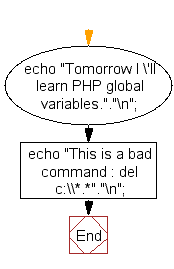PHP Exercises : Display strings
PHP : Exercise-2 with Solution
Write a PHP script to display the following strings.
Sample Strings :
'Tomorrow I \'ll learn PHP global variables.''This is a bad command : del c:\\*.*'
String: A string is series of characters, where a character is the same as a byte. PHP supports a 256-character set, and hence does not offer native Unicode support.
Note: As of PHP 7.0.0, there are no particular restrictions regarding the length of a string on 64-bit builds. On 32-bit builds and in earlier versions, a string can be as large as up to 2GB (2147483647 bytes maximum).
A string literal can be specified in four different ways:
- single quoted: The simplest way to specify a string is to enclose it in single quotes (the character ').
- double quoted: The simplest way to specify a string is to enclose it in single quotes (the character ").
- heredoc syntax: A third way to delimit strings is the heredoc syntax: <<<. After this operator, an identifier is provided, then a newline.
- nowdoc syntax (since PHP 5.3.0): Nowdocs are to single-quoted strings what heredocs are to double-quoted strings. A nowdoc is specified similarly to a heredoc, but no parsing is done inside a nowdoc.
Sample Solution: -
PHP Code:
<?php
echo "Tomorrow I \'ll learn PHP global variables."."\n";
echo "This is a bad command : del c:\\*.*"."\n";
?>
Sample Output:
Tomorrow I 'll learn PHP global variables. This is a bad command : del c:\*.*
Flowchart:

PHP Code Editor:
Contribute your code and comments through Disqus.
Previous: Write a PHP script to get the PHP version and configuration information.
Next: $var = 'PHP Tutorial'. Put this variable into the title section, h3 tag and as an anchor text within an HTML document.
What is the difficulty level of this exercise?
Test your Programming skills with w3resource's quiz.
PHP: Tips of the Day
How to Sort Multi-dimensional Array by Value?
Try a usort, If you are still on PHP 5.2 or earlier, you'll have to define a sorting function first:
Example:
function sortByOrder($a, $b) {
return $a['order'] - $b['order'];
}
usort($myArray, 'sortByOrder');
Starting in PHP 5.3, you can use an anonymous function:
usort($myArray, function($a, $b) {
return $a['order'] - $b['order'];
});
And finally with PHP 7 you can use the spaceship operator:
usort($myArray, function($a, $b) {
return $a['order'] <=> $b['order'];
});
To extend this to multi-dimensional sorting, reference the second/third sorting elements if the first is zero - best explained below. You can also use this for sorting on sub-elements.
usort($myArray, function($a, $b) {
$retval = $a['order'] <=> $b['order'];
if ($retval == 0) {
$retval = $a['suborder'] <=> $b['suborder'];
if ($retval == 0) {
$retval = $a['details']['subsuborder'] <=> $b['details']['subsuborder'];
}
}
return $retval;
});
If you need to retain key associations, use uasort() - see comparison of array sorting functions in the manual
Ref : https://bit.ly/3i77vCC
- New Content published on w3resource:
- HTML-CSS Practical: Exercises, Practice, Solution
- Java Regular Expression: Exercises, Practice, Solution
- Scala Programming Exercises, Practice, Solution
- Python Itertools exercises
- Python Numpy exercises
- Python GeoPy Package exercises
- Python Pandas exercises
- Python nltk exercises
- Python BeautifulSoup exercises
- Form Template
- Composer - PHP Package Manager
- PHPUnit - PHP Testing
- Laravel - PHP Framework
- Angular - JavaScript Framework
- Vue - JavaScript Framework
- Jest - JavaScript Testing Framework
